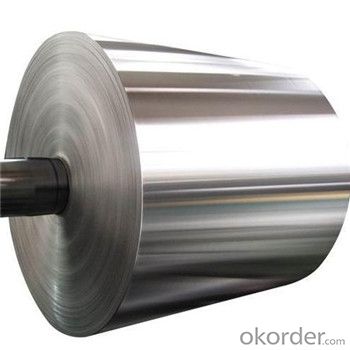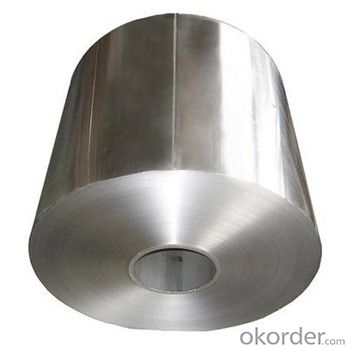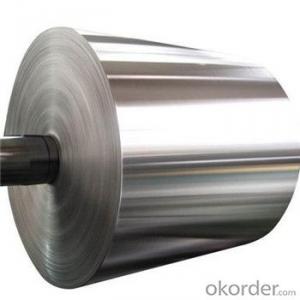Aluminium Household Foil Jumbo Foil for Food Wrapping and Packaging
- Loading Port:
- China main port
- Payment Terms:
- TT OR LC
- Min Order Qty:
- 3 m.t.
- Supply Capability:
- 10000 m.t./month
OKorder Service Pledge
OKorder Financial Service
You Might Also Like
Item specifice
1. Specification of Aluminium Household Foil Jumbo Foil for Food Wrapping and Packaging
Alloy&Temper: 8011-O
Thickness: 0.009--0.03mm
Width:200mm--1500mm
ID: 76mm, 150mm, 152mm
MOQ: 3 TONS
2. Feature of Aluminium Household Foil Jumbo Foil for Food Wrapping and Packaging
Household foil is available in a variety of formats. In addition to a range of widths and lengths there are textured versions and ready-cut sheets, making it easy to use without unreeling and tearing. ‘Non-stick’ foil can solve many problems, such as baked-on food. Another special foil is black on one side, which transfers radiant heat more efficiently from the black side, making it ideal for roasting.
Most households are used to having aluminium foil in the home. It has become an essential part of modern household convenience – for cooking, reducing cleaning chores in the kitchen and for its many uses around the home, garden or workshop. In commercial kitchens too – restaurants, canteens, schools and hospitals, etc.
3. Certificate:
SGS and ROHS(if client request, paid by client), MTC(plant provided), Certificate of Origin(FORM A, FORM E, CO), Bureau Veritas and SGS (if client request, paid by client), CIQS certificate
4. Image of Aluminium Household Foil Jumbo Foil for Food Wrapping and Packaging


5. Package and shipping of Aluminium Household Foil Jumbo Foil for Food Wrapping and Packaging
eye to sky
eye to wall
with wooden pallet (wooden case also available)
6. FAQ
1) What is the delivery time?
Dpends on actual order, around 20 days
2) What is the QC system:
We have QC staff of 20 persons and advanced equipment, each production is with MTC traced from Aluminum ingot lot.
3) What market do you mainly sell to?
Australia, America, Asia, Middle East, Western Europe, Africa etc
- Q:How are aluminum coils cleaned and maintained?
- Aluminum coils are commonly used in HVAC systems and refrigeration units, and it is essential to clean and maintain them regularly to ensure optimal performance and efficiency. Here is a step-by-step guide on how to clean and maintain aluminum coils: 1. Safety first: Before starting any cleaning process, ensure that the power to the HVAC system or refrigeration unit is turned off to avoid any accidents. 2. Remove debris: Begin by removing any visible debris, such as leaves, dirt, or dust, from the aluminum coils. Use a soft brush or a vacuum cleaner with a brush attachment to gently remove the debris. 3. Spray cleaning solution: Prepare a cleaning solution by mixing a mild detergent or coil cleaner with water. Follow the instructions on the product label to achieve the correct dilution ratio. Transfer the solution into a spray bottle. 4. Apply the cleaning solution: Spray the cleaning solution onto the aluminum coils, ensuring that all areas are covered. Allow the solution to sit for a few minutes to loosen any dirt or grime. 5. Scrub the coils: Use a soft brush or a coil cleaning brush to scrub the aluminum coils gently. Be cautious not to apply excessive pressure, as it may damage the delicate fins on the coils. Focus on areas with stubborn dirt or buildup. 6. Rinse with water: After scrubbing, rinse the aluminum coils thoroughly with clean water. A hose or a pressure washer on a low setting can be used to ensure all the cleaning solution and dirt are removed. Ensure that the water flows in the opposite direction of the airflow to avoid pushing debris further into the coils. 7. Check for any damage: While cleaning, inspect the aluminum coils for any signs of damage, such as bent fins or leaks. If any issues are found, it is recommended to contact a professional technician for repairs. 8. Allow to dry completely: After rinsing, allow the aluminum coils to air dry completely before turning the power back on. This will prevent any moisture-related issues and ensure the coils are ready for use. 9. Maintain a regular cleaning schedule: To keep the aluminum coils in excellent condition, it is crucial to establish a regular cleaning schedule. Depending on the usage and environmental factors, cleaning every three to six months is generally recommended. However, if the coils are installed in a highly polluted or dusty area, more frequent cleaning may be required. By following these steps and maintaining a regular cleaning schedule, you can ensure that your aluminum coils remain clean, efficient, and in optimal working condition.
- Q:if air goes throught a lot of tiny aluminum will cause cooling? Why am i asking this because when you see inside the computer desktop has heatsink fan, and some of the heatsink are made by aluminum.
- The aluminium heatsink absorbs the heat from the component it is connected to, the heatsink will have a very large surface area-to-volume and the heat will pass into the air due to this. so you can see its not actualy the metal that causes cooling, the metal just transfers the heat to the air where it will be taken away by fans etc.
- Q:Do aluminum coils require any special maintenance?
- To ensure aluminum coils perform at their best and last longer, regular maintenance is necessary, just like any other HVAC system component. While they don't need any special maintenance, attention and care are still required for efficient functioning. Maintenance tasks for aluminum coils include cleaning, inspection, and occasional straightening. Cleaning the coils is crucial to remove accumulated dirt, dust, and debris that can hinder heat transfer and restrict airflow, reducing the system's overall efficiency. Soft brushes or vacuum cleaners can be used for this task, taking care not to damage the fins and coils. Regular inspection is necessary to identify corrosion, leaks, or damage on the coils. Addressing these issues promptly can prevent further deterioration and costly repairs. Checking for bent or damaged fins and straightening them if needed is recommended to maintain proper airflow. Additionally, keeping the surrounding area clear of debris or vegetation is essential to prevent obstruction of airflow, increased energy consumption, and potential compressor damage. Regularly trimming vegetation and maintaining a clean area will help the coils perform optimally. Lastly, it is advisable to have a professional HVAC technician perform annual maintenance on the HVAC system, including the aluminum coils. They can conduct a thorough inspection, use specialized equipment for cleaning, check refrigerant levels, and ensure the system operates at its peak performance. In conclusion, regular maintenance including cleaning, inspection, and occasional straightening is necessary for optimal performance, damage prevention, and extended lifespan of aluminum coils.
- Q:why is aluminum oxide used more frequently than silicon carbide as an abrasive?What r the different types of tool feed mechanism in USM process.
- Aluminum oxide and silicon carbide are used to grind two completely different sets of materials. Steels and other ferrous alloys are best ground with an aluminum oxide wheel, and the majority of grinding tasks are grinding ferrous alloys. At home, tools are made of steel, and so home bench grinders come with Al2O3 wheels. The same with handheld angle grinders - most welding is done with ferrous alloys. For aluminum and carbides, a silicon carbide wheel will yield better results.
- Q:When you open an aluminum beverage can, do particles of aluminum get into the drink?
- No. Aluminum has metallic bonds, so atoms don't break off that easily.
- Q:Are aluminum coils suitable for automotive heat shields?
- Yes, aluminum coils are suitable for automotive heat shields. Aluminum is a lightweight and highly heat-resistant material, making it an ideal choice for heat shields in vehicles. Its excellent thermal conductivity allows it to effectively dissipate and reflect heat, protecting sensitive components and reducing the risk of overheating. Additionally, aluminum coils are durable and can withstand the harsh conditions often encountered in automotive applications.
- Q:Can aluminum coils be used in the production of aluminum siding?
- Yes, aluminum coils can be used in the production of aluminum siding. Aluminum coils are commonly used in the manufacturing process of aluminum siding due to their durability, lightweight nature, and resistance to corrosion. These coils are usually processed through a coil coating line, where the aluminum is coated with a protective layer to enhance its performance and aesthetics. The coated aluminum coils are then formed and shaped into the desired siding panels, which can be installed on residential or commercial buildings. Aluminum siding is a popular choice for its low maintenance requirements, longevity, and ability to withstand various weather conditions.
- Q:Can aluminum coils be used in the production of solar reflectors?
- Certainly! Solar reflectors can utilize aluminum coils in their production. Due to its exceptional reflectivity and durability, aluminum is widely employed in the manufacturing of these reflectors. The coils can be manipulated and molded into the desired shape for the reflector, facilitating efficient sunlight reflection onto the solar panels. Furthermore, aluminum's lightweight nature simplifies its handling and installation in solar reflector systems.
- Q:Are aluminum coils suitable for electrical conductors?
- Yes, aluminum coils are suitable for electrical conductors. Aluminum is a widely used material in the electrical industry due to its excellent electrical conductivity. It has around 61% conductivity of copper, which is the most commonly used metal for electrical conductors. Aluminum coils are lightweight, cost-effective, and have good thermal conductivity, making them a popular choice for various electrical applications. However, it is important to note that aluminum has a lower tensile strength compared to copper, so it may require a larger cross-sectional area to achieve the same level of current carrying capacity. Additionally, proper insulation and connectors are necessary to prevent oxidation and ensure efficient electrical conductivity in aluminum coils.
- Q:To put aluminum heads on my car do i have to add other things or basically can i just get them and put them on
- just put them on
1. Manufacturer Overview |
|
|---|---|
| Location | |
| Year Established | |
| Annual Output Value | |
| Main Markets | |
| Company Certifications | |
2. Manufacturer Certificates |
|
|---|---|
| a) Certification Name | |
| Range | |
| Reference | |
| Validity Period | |
3. Manufacturer Capability |
|
|---|---|
| a)Trade Capacity | |
| Nearest Port | |
| Export Percentage | |
| No.of Employees in Trade Department | |
| Language Spoken: | |
| b)Factory Information | |
| Factory Size: | |
| No. of Production Lines | |
| Contract Manufacturing | |
| Product Price Range | |
Send your message to us
Aluminium Household Foil Jumbo Foil for Food Wrapping and Packaging
- Loading Port:
- China main port
- Payment Terms:
- TT OR LC
- Min Order Qty:
- 3 m.t.
- Supply Capability:
- 10000 m.t./month
OKorder Service Pledge
OKorder Financial Service
Similar products
New products
Hot products
Related keywords





























